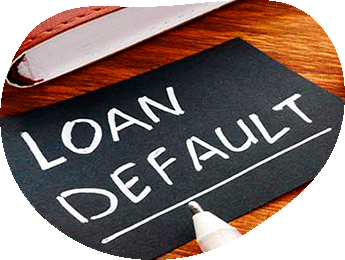Looking for a loan to get out of debts?
Simply complete the short request form to solve your emergency!
Apply NowI read and agree to Terms, Rates, Privacy Policy, before submitting loan requests.

If you’re wondering what this means, you’re not alone. Defaulting on a loan is confusing, and it’s something we don’t like to think about it. But, as the economy changes, we must learn what happens when someone defaults on a loan.
When you get a loan, there are certain things that you can’t do. If you do them, the loan servicer can take action against you. One of those things is defaulting on a loan.
What does it mean to default on a loan? And what happens if you do? Here’s everything you need to know about defaulting on your loans.
Before borrowing a loan, you should first know: What does defaulting on a loan mean? When you borrow money, some terms and conditions govern how much time has to pass before the borrower must start making loan payments. Defaulting a loan means when these loan terms are violated. You might think of default payment meaning as “not paying your bills,” but in this case, it means failing to meet the expectations set forth by the lender. A default can also occur on unsecured debt. For example, medical bills or credit card balances are considered unsecured debt.
The most common default loan type involves missing one or more monthly payments on an installment loan like a credit card or student loan. But there are other types of loan defaults as well. For example, any breach of contract between lender and borrower constitutes a default if they fail to honor their commitments under that agreement (for example, if the borrower fails to make timely loan payments).

The first thing that happens when you default on your loan is that you will probably get contacted by the payday lender or debt collector trying to reach you. If they can’t find you, they might hire a collection agency. Once they’ve done that, they’ll start sending letters and phone calls demanding the minimum required payment. While they may threaten you with jail for not paying a payday loan, it is highly unlikely to occur.
If this doesn’t work, the debt collectors may file a lawsuit against you in court and seize your tax refunds. If a lawsuit is filed against you and no one responds, the judge will issue an order to garnish wages. Wage garnishment is used to collect money from wages or bank accounts so that the payday lender can pay back the debts owed by the person who owes them.
Let’s see what happens if you default on the following types of loans:
The first thing that happens when a student loan defaults are that the loan servicer will file a claim against your wages, bank accounts, and property. They’ll probably order a wage garnishment to repay the student loan if they find you. If they don’t find you 270 days from the last monthly payment, they might sue you in court and get a judgment against your property from the court.
If you have federal student loans, there are other consequences as well: Your credit score could drop by 100 points or more depending on how much money is owed and whether or not consecutive payments have been made recently (or at all). You may also have financial hardship getting a new student loan or credit card because lenders look at your loan payment history when deciding whether to give you money. A student loan default will remain in borrowers’ credit reports for a long time. To overcome these problems, you can rely on federal student aid, which could help you make student loan payments.
If a borrower defaults on a credit card, they got a few options, but they’re all terrible. First, if you default for 180 days on your credit card debt, your lender can sue you for the total amount of the entire loan balance due. Moreover, credit card companies might get a judgment against you that allows them to garnish your wages or even seize property to pay off the debt.
If you do not make your mortgage payments, your lender may foreclose on your home after 30 days from the last payment. Foreclosure is the legal process that allows the mortgage owner to sell the property and use the proceeds to pay off the debt.
The most common reason for foreclosure or mortgage default is failure to make the required monthly payments. However, foreclosure of a mortgage loan can be avoided in many cases by keeping up with your trouble-making payments and working with your lender about any problems.
The first thing that happens if you default on a car loan is that your lender will charge late fees after 1 to 30 days from the last payment. A late fee on an auto loan is an interest charge imposed by lenders as a penalty for paying late on a bill or loan payment. They’re pretty familiar with most types of loans, including auto loans. Of course, there are limits on how much these auto loan’ fees can be (they can’t exceed the car loan amount of your original payment), but they’re still something to watch out for.
What kind of loans are we talking about? Secured personal loans have real estate or other personal property used as collateral for the loan. If you default on a secured loan, you could lose the security provided as collateral for personal loans. Secured business loans are made against the business’s equipment and/or other assets. Compared to secured loans, unsecured loans don’t have collateral to offer. However, if you default on a payday loan, the information will stay in the system for 6 years affecting your credit history.
If you default on a secured loan, your lender can take back the security they gave you to secure the loan. For example, the lender could repossess these items if you took out a boat loan and failed to make payments on time. If this happens, it will be up to them whether they choose to sell those items or keep them until they are paid off in full.

Like most people, you’ve heard of both “defaulting” and “delinquency” regarding loans. But what’s the difference between the two?
Loan default is the failure to make a payment on a loan for at least 30 days after it’s due. Once your account defaults, you must pay the total amount of your loan plus all associated fees or risk losing your vehicle or other collateral.
Delinquency is simply paying late. It doesn’t mean that your account has been placed in loan default. You have up to 60 days after your payment was due before your bank account can be considered delinquent. If you have a late payment, contact your lender immediately so they can work with you to set up an arrangement that works for both parties involved.
Have you ever been overwhelmed with debt? Maybe you’ve been making payments on your student loans for a few years now, and it feels like you’ll never get out of default. Or perhaps you’re just starting to struggle with debt. For example, you graduated from college and got a job, but your car broke down, and you needed to spend all your money on repairs.
Whether you’ve been struggling with debt for years or just started, it can be hard to know where to begin when getting out of loan default. Here are six steps:
1. Make a list of all your debts and how much they are.
2. Make a budget that includes all your expenses (food, rent/mortgage, transportation, etc.)
3. Cut back on unnecessary spending. It could mean canceling cable, getting rid of Netflix or Hulu subscriptions, or cutting back on eating out once weekly.
4. Find ways to increase your income. Maybe take on an extra job or two per week (don’t overdo it!).
5. Talk with someone about getting help if necessary. It could be a friend, a family member, or a credit counselor.
6. Try a loan consolidation program or federal student aid (if you are a student) that can help you pay missed payments.
Simply complete the short request form to solve your emergency!
Apply NowI read and agree to Terms, Rates, Privacy Policy, before submitting loan requests.
In the world of loans, the grace period is the period between the time you receive your loan and the time you are expected to make your first payment. An example of a grace period may be a student loan deferment. It is an agreement between a student and a lender that may postpone or reduce the loan repayment.
It’s an essential part of taking out a loan because it shows lenders that you’re serious about paying back what you owe. It’s also a good way for borrowers to get used to their new debt obligations before they start paying them.
A defaulted cash loan will affect your credit in several ways. The first is that it will show up on your credit report. It means that anyone who checks your credit report through major credit bureaus will know about the defaulted cash loan. They may not want to do business with you because of it.
Another way a defaulted loan affects you is by affecting your credit score. When lenders see that you’ve been late or missed payment on previous loans and accounts, they may be less likely to lend money to you in the future—even if those previous loans were paid off in full and closed out many years ago.

If you’re struggling to make payments on your debt, you might be wondering if it’s a good idea to keep an eye on your credit score. The answer is yes!
Your credit score is a number that represents how reliable and trustworthy you are when it comes to repaying loans and other forms of credit. The higher your credit scores, the more likely lenders will trust you and be willing to give you credit. Therefore, it can be beneficial when you need a direct consolidation loan or line of credit for something big (like buying a house or car).
But what about if you’re struggling with making payments? Shouldn’t your lender have some kind of protection against people who aren’t reliable enough? The truth is that lenders do have protections in place, but, together with debt collectors, they don’t always work out in your favor.
For example: If you don’t pay back a loan or line of credit, the lender can take action against you by sending an account to a collection agency. It can negatively impact your credit score by lowering it or even dropping it together! If this happens frequently enough with your poor credit history, it could prevent you from getting future credit loans or lines of credit until things improve financially (and we all know how long that could take).
To avoid defaulting on a loan, follow these tips:
– First, do some research before applying for a loan.
– Don’t choose a repayment plan for your loan based solely on the interest rate (or any other factor).
– If possible, get help from friends and family to repay your loans more quickly.
– Consider getting another job if you can’t make ends meet with your current one.
– Try not to take out more than one loan at once.
– Finally, you can declare bankruptcy and benefit from loan forgiveness.
If you default on a loan, the lender can take action against you. For example, the lender may try to collect the debt by selling it to a debt collection agency or another person. They may also be able to sue you for personal finance. In addition, you may have to pay court costs, attorney fees, and any damages caused by your failure to pay back the loan.
A paid-off debt will not appear on your credit report after 7 years from when it was first reported as delinquent (meaning you failed to pay). However, if you default on a $2,000 loan (for example) and cannot make a debt relief in full after 180 days, that debt will remain on your report for up to 7 years from when it was first reported as delinquent.
If you’re thinking about defaulting on your loan, you might want to think twice. Not only will it affect your credit score, but it could also get you into legal trouble.
If you default on your loan, you’ll likely lose the property used as collateral. And that’s not always an easy thing to do. If you’re looking at foreclosure, it can take months or even years before the bank takes ownership of the property.